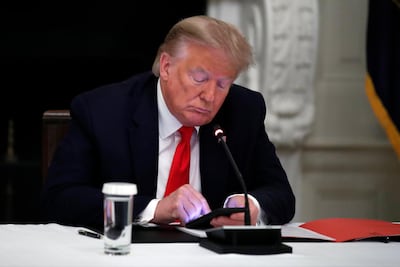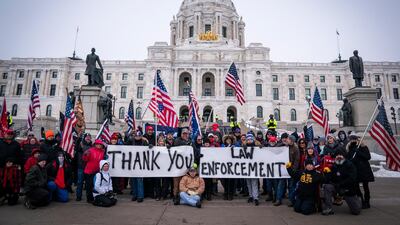On Wednesday, the Donald Trump era in US politics crashed and burned irreparably, with near-simultaneous catastrophes in Georgia and, especially, Washington.
In once-solidly Republican Georgia, the Democrats won both runoff races, unexpectedly seizing narrow control of the Senate, the upper house of Congress, the American legislature.
Under Mr Trump’s uncontested leadership, Republicans have lost the presidency and both houses of Congress, and he’s bequeathing them a furious, internecine battle.
Yet far worse followed.
As the world knows, a mass demonstration Mr Trump organised to confront and attempt to stop Congress’s ratification of the election results became, with grim predictability, a violent assault on the legislature by a furious, insurrectionary horde.
Mr Trump and his allies claim they never promoted violence, but their words on that day and before were clear and damning.
Therefore, the Democrats, many in the media and even some leading Republicans are holding him personally responsible for inciting the violence.
The security failure was so severe that if the rampaging pro-Trump rioters in the building had bombs, much of the US government, including the Vice President, could have been instantly wiped out. Congressional leaders realise how exposed, and thus how fortunate, they were.
The fiasco raises serious questions of incompetence or collusion, but it had two silver linings.
Republican leaders experienced the terror of the event personally. More importantly, the mob was denied a host of martyrs or the myth of violent repression by the "deep state". Instead, they just dispersed in failure and, in many cases later, facing arrest, while Congress reconvened and confirmed the election results.
Yet six people died, including a Capitol Police officer. The killing of a police officer will mean that authorities will be resolutely determined to punish lawbreakers, who could face felony murder charges.
Even the President is potentially vulnerable to charges of incitement.
As the chaos unfolded and under tremendous pressure, Mr Trump eventually issued brief Twitter and video statements ostensibly intended to call for peace. But he emphasised his great love for the mob, said with evident pride that the day should be "remembered forever" and once again encouraged rage over what he claims, without evidence, was a stolen landslide election victory.
Although the message appealed for calm, in effect it was encouraging and vindicating the violence.

Mr Trump’s own former top Russia expert, Fiona Hill, explained, “The president was trying to stage a coup.” After all 10 living former defence secretaries intervened through a January 3 public statement warning the military to refuse to overthrow the system, she said, “Trump tried to incite it himself,” by instigating a riot. “This could have turned into a full-blown coup had he had any of those key [military] institutions following him. Just because it failed or didn’t succeed doesn’t mean it wasn’t real.”
This understanding is widespread and bipartisan.
Mr Trump’s already-tenuous political credibility – recently battered even more by the leak of a breathtakingly corrupt phone call demanding Georgia officials somehow "find” him enough nonexistent votes from November to “win” that state – disintegrated.
A slew of resignations followed, including by Transportation Secretary Elaine Chao, Education Secretary Betsy DeVos, special envoy to Northern Ireland Mick Mulvaney, deputy national security adviser Matthew Pottinger and economic adviser Tyler Goodspeed.
Late Thursday, Mr Trump finally condemned the violence, suddenly acknowledged Mr Biden will become president, and promised a peaceful transfer of power. Yet given the failed deadly insurrection, that promise is already shattered.
This reversal, which he reportedly regrets, was damage control to prevent additional senior officials from resigning, including national security adviser Richard O'Brien and acting homeland security secretary Chad Wolf. It apparently succeeded in keeping them in his government for a few more days.
But the ploy’s primary purpose was to resurrect the political viability of "Trump 2024", the idea of another Trump term in four years.
That seems to be failing.
Senior figures on all sides have concluded that Mr Trump is dangerously reckless.
Given the power of the US president, anxiety is profound. House Speaker Nancy Pelosi even consulted senior military officers about how to disregard or circumvent the possibility of an unhinged presidential nuclear attack order.
There have been acknowledged discussions among senior administration officials about using provisions in the 25th amendment of the US Constitution to remove Mr Trump against his will, but that’s highly unlikely.
Democratic leaders, major newspapers, and some senior Republicans called on Mr Trump to resign. Since he won’t, Democrats are preparing a second impeachment proceeding.
Another impeachment could be a purifying blob of symbolic hand-sanitiser to restore national political hygiene. But a Senate trial would have to come after Mr Biden takes office. It might be wiser to leave Mr Trump, as a private citizen, to prosecutors and courts.
The ultimate indicator of his sudden, spectacular downfall comes from social media, not politics. After years of cowering in fear of him, Twitter has banned Mr Trump permanently. Facebook has done so indefinitely.
Social media is now the epicentre of discursive and cultural power. Such raw power invariably and immediately senses when clout is suddenly lost, and pounces.
The most passionate votaries of Mr Trump – possibly around one quarter of committed Republicans – will still venerate him for now. But the rest of the country and his own party are already moving on, and eventually so will they.
In Georgia and Washington, Wednesday in America projected a split-screen image contrasting Mr Trump's imaginary world, in which he’s the election winner and still politically potent, with reality, and between the rule of law versus its furious, violent enemies.For now, reality and the rule of law are prevailing.

There's nothing Mr Trump fears more than being a “loser”. Yet he has lost both houses of Congress, the White House, his crucial social media platforms, political viability and whatever was left of his already-tattered reputation.
Yet rarely has an American politician lost so much and been so thoroughly defeated, repudiated and reviled.
Hussein Ibish is a senior resident scholar at the Arab Gulf States Institute and a US affairs columnist for The National
































